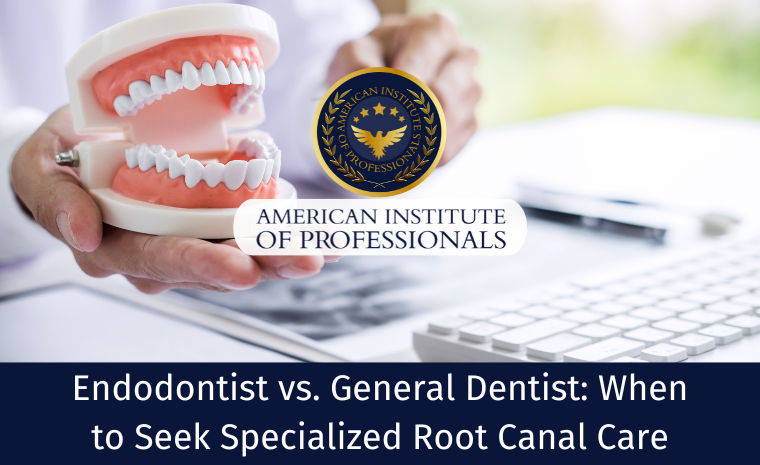When it comes to dental care, understanding the roles of different dental professionals is essential. Two primary categories of dental professionals are endodontists and general dentists. While both are experts in oral health, they have distinct areas of specialization.
This article aims to provide insights into the differences between endodontists and general dentists, specifically focusing on when it is appropriate to seek specialized root canal care from a competent endodontist.
Endodontist vs. General Dentist
An endodontist and a general doctor (often referred to as a general practitioner or primary care physician) are two different types of healthcare professionals with distinct areas of specialization and expertise.
Endodontist
Endodontics is a specialized field of dentistry that focuses on the diagnosis and treatment of dental pulp and root canal-related issues. Endodontists are dental specialists who have undergone additional training after completing dental school. They possess advanced knowledge and expertise in root canal procedures, endodontic surgeries, and managing complex cases involving dental pulp.
An endodontist’s primary role is to diagnose and treat diseases and injuries affecting the dental pulp and the surrounding gum tissues. They specialize in performing root canal therapy, which involves removing the inflamed or infected tooth pulp and sealing the root canal to prevent further bacterial infection. Endodontists also handle cases that involve dental trauma, cracked teeth, and other complex root canal procedures.
General Dentist
General dentistry, on the other hand, encompasses a broader scope of dental care. Dentists are the primary dental care providers who diagnose, treat, and manage overall oral health. They typically perform routine dental procedures such as cleanings, fillings, extractions, and preventive patient care, including oral examinations and X-rays.
They provide comprehensive dental care, including preventive, restorative, and cosmetic treatments. General dentists also educate patients on proper oral hygiene practices and offer guidance on maintaining optimal oral health.
Recognizing dental issues and understanding which dental professional to approach for specific treatments is vital. While general dentists can handle many common dental problems, certain symptoms may indicate the need for specialized endodontic care.
Choosing the right dental professional depends on the nature of your dental issue. If it is a routine dental check-up or a minor problem, a general dentist is an appropriate choice. However, for complex root canal-related problems, it is wise to consult an endodontist for specialized care.
Experiencing a root canal problem?
When to Seek Care from an Endodontist
While general dentists can perform basic root canal treatments, endodontists have additional specialized training and expertise in managing complex cases and performing advanced procedures related to dental pulp and root canal treatments.
If your dental issue involves the dental pulp or root canal system, it is advisable to seek specialized care from an endodontist.

Signs You May Need Specialized Root Canal Care
Poor oral health can cause serious problems, sometimes leading to bacterial infection. Root canal treatment is a common procedure. It involves removing the infected or damaged tooth pulp, cleaning the root canal space, and filling it with a biocompatible material. The diseased tooth is then restored with a crown or filling material to protect it from further damage. Root canal treatment is typically performed under local anesthesia and is virtually painless.
Here are some signs and symptoms that may indicate the need for specialized root canal care:
- Persistent toothache
- Sensitivity to hot and cold
- Swelling and tenderness in the gums
- Discoloration or darkening of the tooth structure
- Prolonged sensitivity to chewing or biting
- Recurring abscess or pus discharge
If you experience any of these symptoms, it is crucial to seek professional dental care.
Benefits of Seeking Treatment from an Endodontist
Seeking endodontic treatment offers several benefits that contribute to optimal dental care and improved oral health. Here are some key advantages of choosing an endodontist for specialized root canal treatment:
- Expertise: Endodontists specialize in root canal procedures and have in-depth knowledge of the latest techniques and advancements in the field.
- Higher Success Rates: Endodontists have advanced training and experience in performing root canal treatments, leading to higher success rates and better long-term outcomes.
- Preservation of Natural Teeth: Endodontists strive to save natural teeth whenever possible, avoiding the need for extractions and preserving the natural appearance and function of the teeth.
- Management of Complex Cases: Endodontists are skilled in managing complex cases, including cases with difficult-to-locate canals, narrow canals, or extensive infection.
- State-of-the-Art Technology: Endodontists utilize state-of-the-art technology and equipment, such as digital imaging and operating microscopes, to enhance accuracy and improve treatment outcomes.
When to Seek Specialized Root Canal Care: Frequently Asked Questions
Are root canals always painful?
No, with modern techniques and anesthesia, root canal treatments are generally no more uncomfortable than getting a filling.
Can a general dentist perform root canal treatment?
General dentists can perform root canal treatments. However, complex cases are often referred to endodontists for specialized care.
How long does a root canal treatment take?
The duration of a root canal treatment depends on the complexity of the case. Typically, it can be completed in one to three visits.
Will I need a crown after a root canal treatment?
In most cases, a crown or filling is placed after a root canal treatment to protect and restore the tooth.
How can I prevent the need for a root canal treatment?
Maintaining good oral hygiene practices, such as regular brushing and flossing, and visiting your dentist for routine check-ups can help prevent the need for a root canal treatment.
Take Proper Care Of Your Oral Health! Contact An Endodontist Now.
Both endodontists and general dentists play crucial roles in maintaining optimal oral health, but if you experience symptoms related to the dental pulp or require specialized root canal care, consulting an endodontist is what you need.
Don’t let tooth pain or oral discomfort hold you back. Take the first step toward relief and schedule an appointment with our expert team today. Your smile and dental health are our top priorities.





